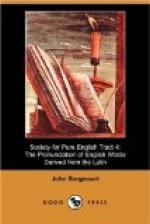The whisper, that to greatness still too
near,
Perhaps, yet vibrates on his Sov’reign’s
ear,
and Shelley
Music, when soft voices die,
Vibrates in the memory.
There are, however, verbs of no literary account which in usage either vary in the stress or take it on the latter syllable. Such are ‘locate’, ‘orate’, ‘negate’, ‘placate’, and perhaps ‘rotate’. With most of these we could well dispense. ‘Equate’ is mainly a technical word. Dictionaries seem to prefer the stress on the ultima, but some at least of the early Victorian mathematicians said ‘[’e]quate’, and the pronunciation is to be supported. Trisyllabic verbs throw the stress back and shorten the penultima, as ‘d[’e]s[)o]late’, ‘s[’u]ff[)o]cate’, ‘sc[’i]nt[)i]llate’. Even words with heavy double consonants have adopted this habit. Thus where Browning has (like Milton and Cowper)
I the Trinity ill[’u]strate
Drinking water’d orange
pulp,
In three sips the Arian frustrate.
While he drains his at one
gulp,
it is now usual to say ‘[’i]llustrate’.
Adjectives of this class take as early a stress as they can, as ‘[’o]rnate’, ‘p[’i]nnate’, ‘d[’e]licate’, ‘f[’o]rtunate’. Nouns from all these words throw the accent back and shorten or obscure all but the penultimate vowel, as ‘ignorance’, ‘evaporation’.
STEMS IN -IA. Here even disyllables shorten the penultima, as ‘copy’, ‘province’, while longer words throw the stress back as well as shorten the penultima, as ‘injury’, ‘colony’, while ‘ignominy’ almost lost its penultimate vowel, and therefore threw back the stress to the first syllable. Shakespeare frankly writes the word as a trisyllable,
Thy ignomy sleep with thee in the grave.
Milton restored the lost syllable, often eliding the final vowel, as in
Exile, or ignominy, or bonds, or pain.
Even with heavy consonants we have the early stress, as in ‘industry’. Greek words follow the same rules, as ‘agony’, ‘melody’. Some words of this class have under French influence been further abbreviated, as ‘concord’.
Corresponding STEMS IN -IO keep the same rules. Perhaps the only disyllable is ‘study’; the shortening of a stressed u shows its immediate derivation from the old French estudie. Trisyllabic examples are ‘colloquy’, ‘ministry’, ‘perjury’. Many words of this class have been further abbreviated in their passage through French. Such are ‘benefice’, ‘divorce’, ‘office’, ‘presage’, ‘suffrage’, ‘vestige’, ‘adverb’, ‘homicide’, ‘proverb’. The stress in ‘div[’o]rce’ is due to the long vowel and the two consonants. A few of these words have been borrowed bodily from Latin, as ‘odium’, ‘tedium’, ‘opprobrium’.




